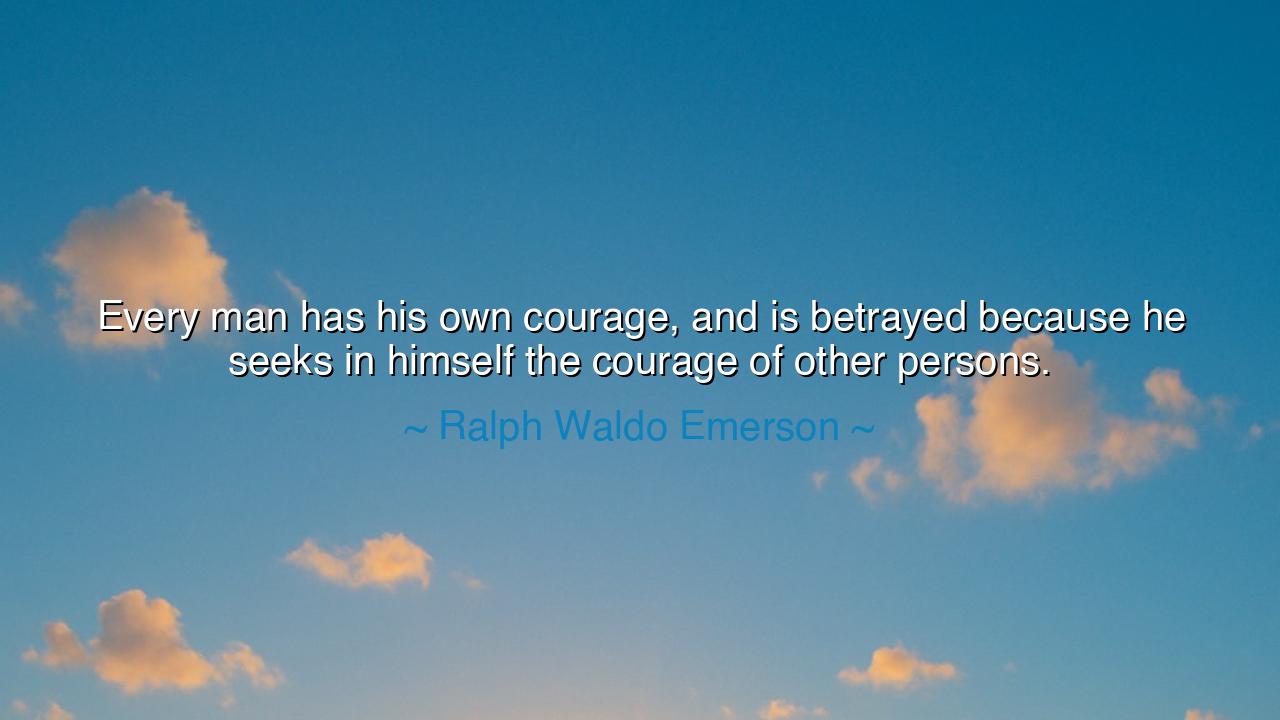
Every man has his own courage, and is betrayed because he seeks
Every man has his own courage, and is betrayed because he seeks in himself the courage of other persons.






When Ralph Waldo Emerson wrote, “Every man has his own courage, and is betrayed because he seeks in himself the courage of other persons,” he unveiled one of the most profound truths of the human soul—that courage is not a uniform fire burning the same in all hearts, but a sacred flame uniquely shaped by each person’s nature. To live bravely, Emerson teaches, is not to imitate the valor of others, but to discover the strength that is proper to oneself. The betrayal he speaks of is not by the world, but by the self—when a man abandons his own way of being strong and tries instead to wear another’s armor.
Emerson, the sage of Concord and the father of American transcendentalism, believed that truth lies within the individual—that every soul contains its own light, its own path to wisdom and virtue. His writings were a call to self-reliance, to inner faith, to the divine independence of character. In this quote, he extends that vision into the realm of courage, warning that imitation, even of greatness, leads to failure. For each man’s spirit is tuned to a different note; to try to act with another’s bravery is to sing a song that does not belong to you. True courage is not borrowed; it is born.
The meaning of this truth becomes clear when we look upon history. Think of Mahatma Gandhi, who faced an empire not with the weapons of his oppressors, but with the power of peace. The world expected defiance through violence, but Gandhi’s courage was of a different kind—quiet, steadfast, moral. Had he sought the courage of warriors, he would have perished in the shadow of their strength. But he chose instead the courage of his own soul, and with that, he moved the hearts of millions. This is what Emerson meant: that a man must act from his own center, not from the borrowed strength of others.
Courage wears many faces. To the soldier, it is the will to stand before death; to the mother, it is the endurance to raise her children in hardship; to the poet, it is the daring to speak truth against silence; to the humble worker, it is the discipline to labor honestly despite unseen toil. The tragedy of life, Emerson says, is that many do not recognize their own courage. They measure themselves against others—ashamed because they are not bold in the same way. Yet courage does not come in one form. It may roar like thunder, or it may whisper like prayer. To seek another’s kind of courage is to deny the strength that already dwells within you.
In the ancient world, this wisdom was known to the philosophers and heroes alike. Socrates, accused before his city, did not fight with anger or flee with fear. His courage was calm, rooted in faith that truth itself is stronger than death. His disciples might have wished him to speak with fiery defense, but Socrates’ strength was not in wrath—it was in serenity. He died as he lived, faithful to his nature. And through that calm acceptance, he left behind a courage that transcended the battlefield. Thus the ancients, too, knew what Emerson would later write: that authentic courage arises not from imitation, but from integrity.
In our time, this teaching remains vital. The world praises loud victories and visible strength, but forgets the quiet fortitude of those who endure unseen. Many souls lose themselves chasing another’s ideal—trying to be fearless when their power lies in compassion, or trying to be defiant when their gift is patience. Yet no hero is made by imitation. The oak does not envy the mountain, nor the river the sun. Each fulfills its purpose by being itself. So must we find our own courage, whether it burns brightly or glows softly.
And so, my children of reflection and striving, take these words as a guide: do not seek to be brave as others are brave—seek instead the courage that belongs to you. Listen for it in your heart; it may speak quietly, but it will speak truly. When fear comes, do not ask, “What would they do?” Ask instead, “What is mine to do?” Act from that inner voice, and your strength will be pure. For the world does not need many copies of the same hero—it needs the countless forms of courage that only individuality can give. And in that diversity of strength lies the beauty and resilience of mankind.
Thus, remember Emerson’s wisdom: “Every man has his own courage.” Do not betray yourself by trying to be another. Stand as you are, and let your own flame burn as it was meant to—whether it lights a single lamp or the sky itself. For when each soul walks in its own truth, the world is brighter, and the harmony of human courage becomes the song of creation itself.






AAdministratorAdministrator
Welcome, honored guests. Please leave a comment, we will respond soon